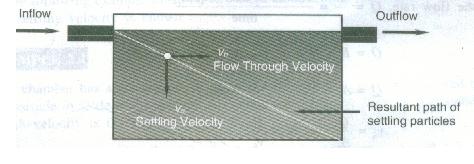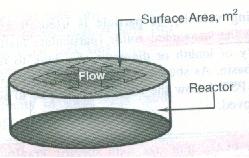..................................................................................................................................................................
By: Haseeb Jamal
1.
Dry or conservatory
system
2.
Water carriage
system (99.9)
Detention Time
Detention Time (Hydraulic Retention Time, HRT) is the length of time a
particle or a unit volume of water/wastewater remains in a reactor/basin/tank.
Mathematically;
HRT, tD = (Volume/Discharge) ------- days/hours/sec
(units)
Flow Through Velocity or Horizontal Velocity and Settling
Velocity

Settling path of a solids particle in a tank
Settling path of a solids particle in a tank
Surface Loading
Rate
Surface Loading Rate or Overflow Rate is the volume of water/wastewater applied
per unit surface area of the treatment basin and is normally expressed in units
of m3/m2-d or gal/ft2-d.
Mathematically;
SLR = (Flow, Q/Area, As) {Numerically; SLR = HRT}

Weir Loading Rate
Weir Loading Rate or Weir Overflow Rate is the quantity of wastewater
flowing over a unit weir length of the tank in a unit time.
It is expressed in units of m3/m-d or gal/ft-d.
Mathematically;
WLR = (Flow, Q/Total Length of Weir, L)
PROBLEM: A treatment unit is 1.5 ft wide, 20 ft long and has a
depth of 2.0 ft. if the wastewater flow rate through the tank is 0.5 ft3/sec.
Calculate; detention time, overflow rate and weir loading
rate.
Organic Loading is the total quantity of organic matter in
terms of BOD or COD that is applied per day over the unit surface area of per
unit volume of the treatment basin or tank.
Mathematically;
OLR = (applied kg of BOD per day)/(volume of the basin)
It is expressed as kg-BOD/ m3-d or kg-COD/ m3-d
PROBLEM: A treatment basin has a diameter of 20 ft and a depth of
2.5 ft.
Calculate the organic loading rate for an effluent of 10.0
MGD having 220 mg/L of BOD.
Food-Microorganisms (F/M) Ratio is the relationship between the available food
(F) and the microorganism (M) present in a biological treatment system.
F/M = [(Q*So)/(V*X)] ----------- it is expressed in unit
of sec-1 or d-1 etc.
Since, HRT tD = V/Q, therefore, F/M = [So/(tD*X)]
Since, HRT tD = V/Q, therefore, F/M = [So/(tD*X)]
PROBLEM: If the wastewater with BOD concentration of 200 mg/L is treated
in a tank having 5 hours HRT and containing 4000 mg/L MLVSS, calculate its F/M
ratio.
Mean Cell Residence Time or Solid Retention Time or Sludge
Age; is the average time in days for which biomass are retained in the
biological reactors.
Haseeb
Jamal. I am a Civil Engineer,
graduated from University
of Engineering and Technology, Peshawar, Pakistan in 2010. I also
have a PG-Diploma in Disaster Management and
MS in Urban
Infrastructure Engineering (In Progress). My expertise include civil
related softwares like AutoCAD,
SAP2000, MS Project, Primavera, MS Office and GIS. My technical skills include
project management, monitoring and evaluation, structural assessment, disaster
risk management, Quantity survey, land survey, material testing, site
management and technical writing. I am trained in writing project progress
reports as well as proposals and concept papers. I have also received advanced
training on surveying, proposal writing, Monitoring and Evaluation of projects
as well as organizations.
I have worked as Project Engineer at
National Research and Development Foundation, Peshawar and CENCON Associates. I
also worked with Spectra Engineering Solutions as Senior Civil Engineer in
monitoring of World Bank and UNDP funded projects all over Khyber Pakhtunkhwa
and FATA. Currently, I am working as Deputy Manager Development at
NayaTel, Peshawar.

No comments:
Post a Comment